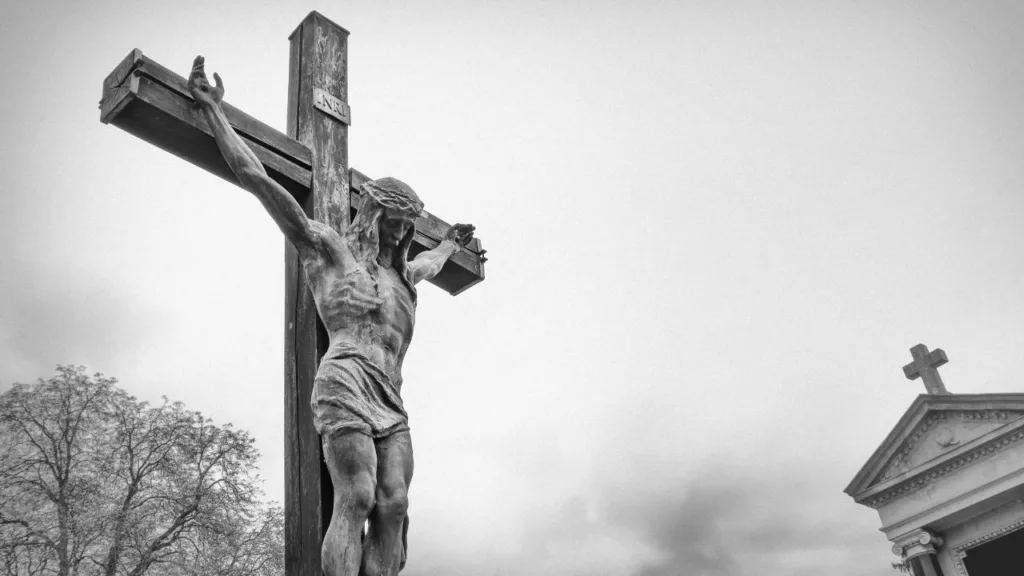
Who Killed Jesus?
Jesus was crucified by the Roman authorities, particularly under the authority of Pontius Pilate, the Roman governor at the time. This execution occurred in Jerusalem during the 1st century AD.
- When Did Christianity Start? | Christian Origins | Truth | 2023
- Do Christians Celebrate Passover?
- Is Taylor Swift a Christian?
Introduction
The crucifixion of Jesus Christ is one of the most pivotal events in human history, and the question of who was responsible for his death has been a subject of debate and controversy for centuries. This article delves into the complex historical context surrounding the crucifixion and explores the different factors and actors involved.

Crucifix Crucified Jesus Christ on CrossWho killed Jesus?
The crucifixion of Jesus Christ was a complex event involving several parties. From a historical perspective, it was the result of the decision by Pontius Pilate, the Roman governor of Judea, who ordered Jesus’s crucifixion. However, it’s essential to recognize that this event was influenced by various factors, including the involvement of Jewish religious authorities, the crowd, and the political climate of the time.
Why did Pontius Pilate order Jesus’s crucifixion?
Pontius Pilate ordered Jesus’s crucifixion, primarily due to pressure from the Jewish religious leaders who viewed Jesus as a threat to their authority and religious teachings. Pilate, while reluctant, ultimately gave in to the demands of the crowd and the religious authorities to maintain order in the region.
Did the Jewish people as a whole kill Jesus?
No, it’s not accurate to attribute the crucifixion of Jesus to the Jewish people as a whole. The events leading to his crucifixion involved a specific group of Jewish religious leaders, a crowd that had gathered during the trial, and some individuals, but not the entire Jewish population.
Did Judas Iscariot play a role in Jesus’s death?
Yes, Judas Iscariot, one of Jesus’s disciples, played a significant role in the events leading to Jesus’s arrest and subsequent crucifixion. He betrayed Jesus by identifying him to the religious authorities, which ultimately led to Jesus’s arrest.
Why is the crucifixion of Jesus significant in Christianity?
The crucifixion of Jesus holds immense significance in Christianity because it is believed to represent Jesus’s sacrificial act to atone for the sins of humanity. It is seen as a central event in Christian theology, symbolizing redemption and salvation.
The Crucifixion of Jesus
- The Role of the Roman Authorities The crucifixion of Jesus took place in the 1st century AD during the Roman occupation of Judea. The Roman authorities played a central role in his execution. Pontius Pilate, the Roman governor of Judea, ultimately ordered Jesus’s crucifixion, albeit reluctantly. He yielded to the pressure of the Jewish religious leaders and the crowd that had gathered.
- The Jewish Religious Leadership The religious authorities of the time, particularly the high priests and the Sanhedrin, played a significant role in the events leading to Jesus’s crucifixion. They viewed Jesus as a threat to their religious authority and saw his teachings as heretical. They sought his arrest and trial, ultimately leading to his condemnation.
- The Crowd’s Role A mob of people gathered during the trial and crucifixion of Jesus. It’s important to note that this crowd was not representative of all Jews but likely consisted of some who demanded his crucifixion while others may have been sympathetic to Jesus. The crowd’s demands for crucifixion may have swayed Pilate’s decision.
- The Betrayal by Judas Iscariot One of Jesus’s disciples, Judas Iscariot, is famously known for betraying Jesus to the authorities. He identified Jesus to the religious leaders, leading to his arrest. Judas’s betrayal is a crucial element in the chain of events that led to the crucifixion.
- The Political Climate The political climate of the time also played a role. The Jewish population was under Roman rule, and tensions often simmered between the Jewish community and the Roman authorities. This political backdrop contributed to the volatile atmosphere surrounding Jesus’s trial and execution.

Different Perspectives
- Christian Perspective From a Christian perspective, Jesus willingly sacrificed himself for the redemption of humanity’s sins. In this view, the responsibility for Jesus’s crucifixion lies with the collective sins of humanity, and the individuals involved were mere instruments in God’s plan.
- Historical Perspective Historians approach the question of who killed Jesus with a focus on the political and social context. They acknowledge the roles of Pilate, the Jewish religious leadership, and the crowd but avoid assigning blame to an entire group. It’s important to remember that the crucifixion occurred in a complex historical context with multiple contributing factors.
Conclusion
The question of who killed Jesus is multifaceted and cannot be answered definitively. The crucifixion was the result of a convergence of historical, political, religious, and individual factors. While Pontius Pilate issued the order, the religious authorities, the crowd, and Judas Iscariot all played significant roles.
Ultimately, the crucifixion of Jesus is a central event in Christian theology and history, representing sacrifice and redemption. It has generated deep theological and historical discussions over the centuries, reminding us of the complexities of human history and the interplay of various forces in shaping significant events.
Was the crucifixion a preordained event?
According to Christian theology, the crucifixion of Jesus was part of God’s plan for the salvation of humanity. In this view, Jesus willingly accepted his crucifixion as a means of reconciling humanity with God.
Are there different interpretations of who killed Jesus?
Yes, various perspectives exist regarding who was responsible for Jesus’s crucifixion. These interpretations may vary between Christian denominations, scholars, and individuals. Some emphasize the role of specific actors, while others focus on broader theological themes.
How should we understand the responsibility for Jesus’s crucifixion today?
It’s important to approach this historical event with sensitivity and avoid assigning blame to entire groups. Recognize that the crucifixion occurred in a complex historical context with multiple contributing factors. Today, the emphasis is often on the theological significance of Jesus’s sacrifice rather than assigning blame.
What lessons can we learn from the crucifixion of Jesus?
The crucifixion of Jesus teaches lessons of sacrifice, redemption, and forgiveness. It reminds believers of the importance of empathy, compassion, and the pursuit of justice. It has also sparked discussions on the complexities of historical events and their interpretations.
How can the understanding of Jesus’s crucifixion contribute to interfaith dialogue?
The understanding of Jesus’s crucifixion can be a point of discussion and reflection in interfaith dialogue. It highlights the importance of respecting diverse beliefs and perspectives while fostering mutual understanding and tolerance among different religious communities.





